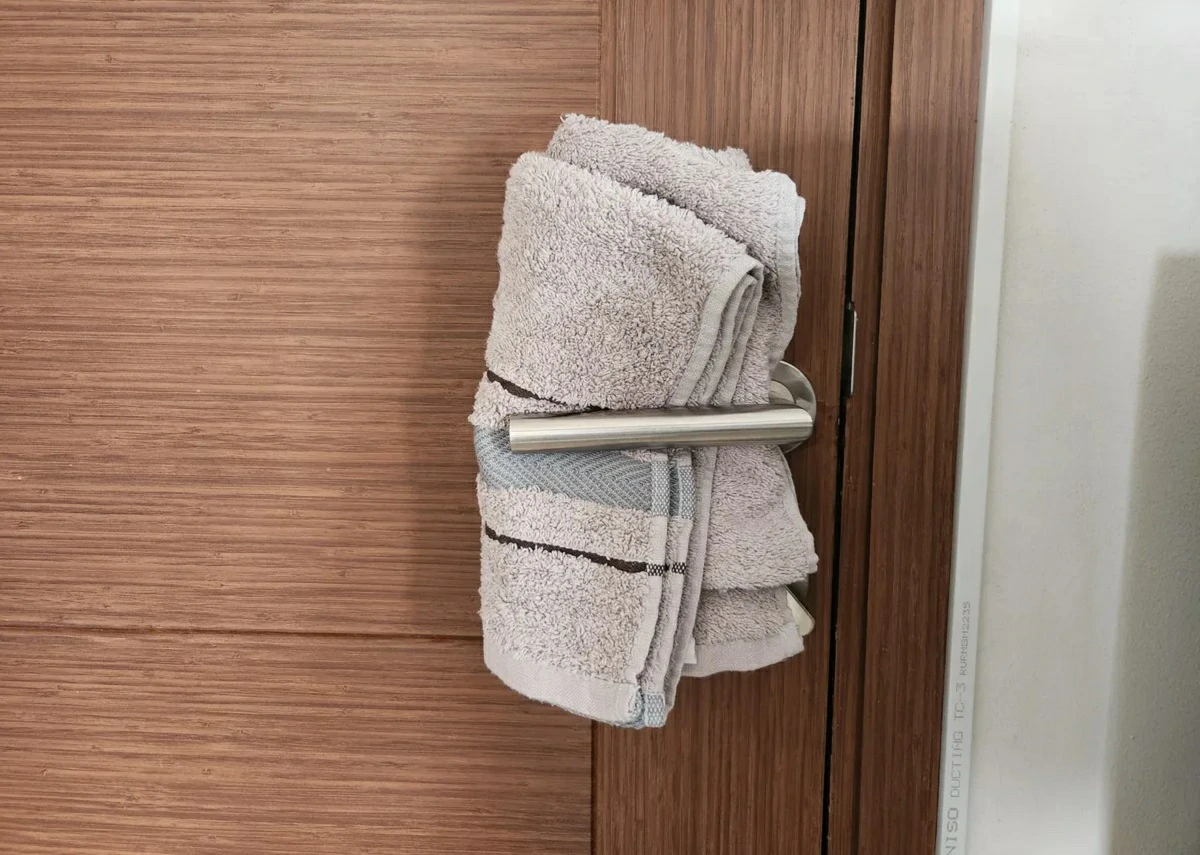How to secure a hotel room door with a towel? Answer is – It’s surprisingly easy to add a simple layer of security to your hotel room door using a towel:
- Roll the towel. Take a hand towel and roll it lengthwise into a tight cylinder.
- Place the towel over the latch. Position the rolled towel over the door’s security latch.
- Close the door. Firmly close the door, ensuring the towel is partially wedged between the door and the frame. This makes it more difficult for someone to disengage the latch from the outside.
Summary
- Even secure hotel rooms can have vulnerabilities.
- A towel can provide an extra layer of security for your door’s latch mechanism.
- The towel makes it harder to manipulate the latch from the outside.
- This technique is simple, cheap, and effective.
- It’s a great safety tip for frequent travelers.
How to Secure Your Hotel Room Door with a Towel
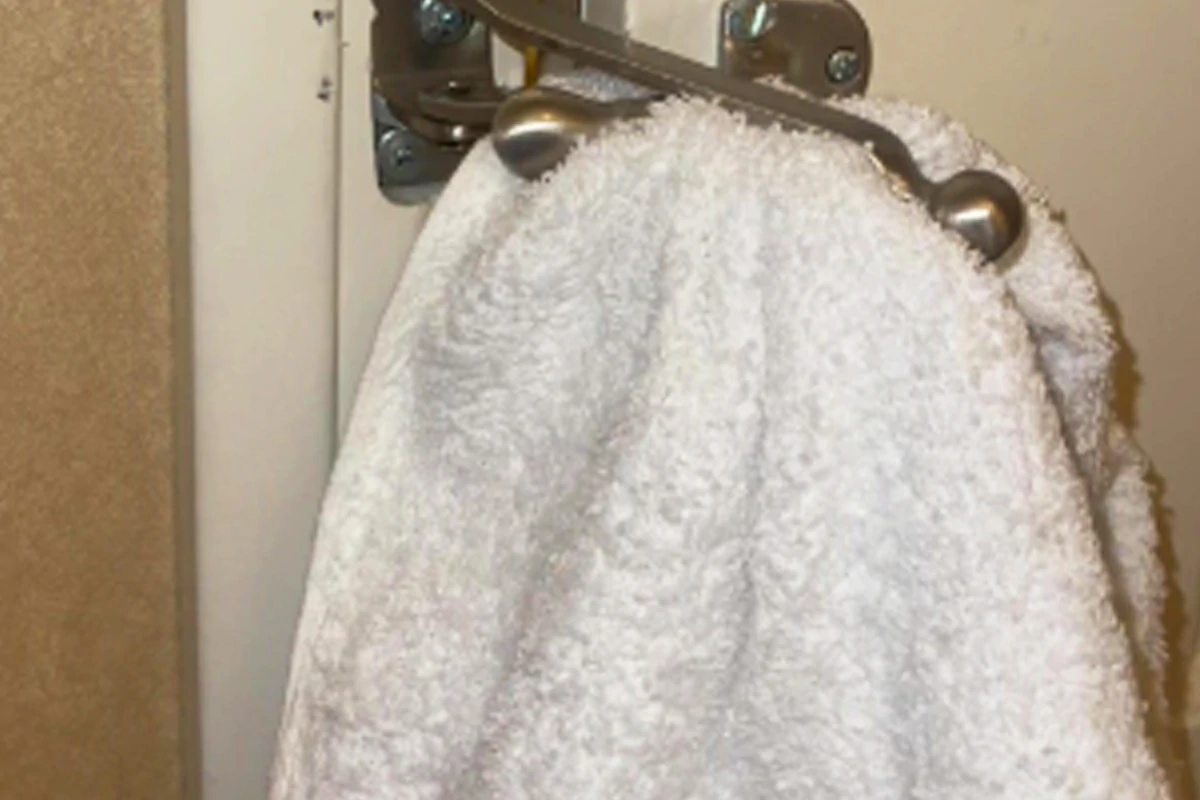
Whether you’re embarking on a long-awaited vacation or a quick business trip, feeling safe and secure in your hotel room is essential for peace of mind.
While most hotels take security seriously, there are always additional steps you can take to enhance your safety and minimize risks during your stay.
Hotel Room Security Concerns
Before we dive into solutions, let’s understand some of the common security concerns associated with hotel rooms:
Unauthorized Access: Hotel rooms, unfortunately, aren’t always immune to unauthorized access. A determined intruder might attempt to bypass standard locks, especially if additional security measures aren’t in place.
Theft: While most hotel staff are trustworthy, there’s always the potential for opportunistic theft of valuables left unattended in a room.
Privacy Concerns: In an increasingly digital world, worries about hidden cameras or surveillance devices in a hotel room, while rare, are not entirely unfounded.
The Importance of Feeling Safe While Traveling
Feeling safe and secure in your temporary accommodations goes beyond just protecting your belongings. According to travel safety expert Jessica Vaughan, “Peace of mind is crucial for a positive travel experience.
When you’re concerned about your safety, it can significantly impact your ability to relax, explore, and fully enjoy your trip.” Implementing basic security measures allows you to focus on the purpose of your travels, whether for leisure or business.
Simple Yet Effective Security Measures
Now, let’s shift our focus to the proactive steps you can take to increase your hotel room security:
Scrutinize the Door Locks: Upon entering your room, take a moment to inspect the door locks. Ensure the deadbolt functions correctly, and check for signs of tampering on any latch mechanisms. If anything seems amiss, request a room change immediately.
The Towel Technique: For an extra layer of security, use a rolled-up towel to partially obstruct the door latch. This makes it more difficult for someone to disengage the lock from the outside.
Utilize the Room Safe: Always store valuables like passports, jewelry, or extra cash in the hotel room’s safe. If the room doesn’t have one, request a secure storage option at the front desk.
Door Wedges and Alarms: Portable door wedges or travel alarms offer supplementary protection, particularly if you’re concerned about unauthorized entry. These compact devices can be found at most travel supply stores.
Be Observant: Trust your instincts. If someone seems suspicious or makes you uncomfortable in the hotel hallways or near your room, alert hotel staff immediately.
Mark Johnson Expert Opinion
Security consultant and former law enforcement officer, Mark Johnson emphasizes the importance of awareness: “Travelers often let their guard down in seemingly safe environments like hotels. By staying alert, utilizing simple security measures, and trusting your gut feelings, you can greatly minimize potential risks.”
How to Secure a Hotel Room Door with a Towel
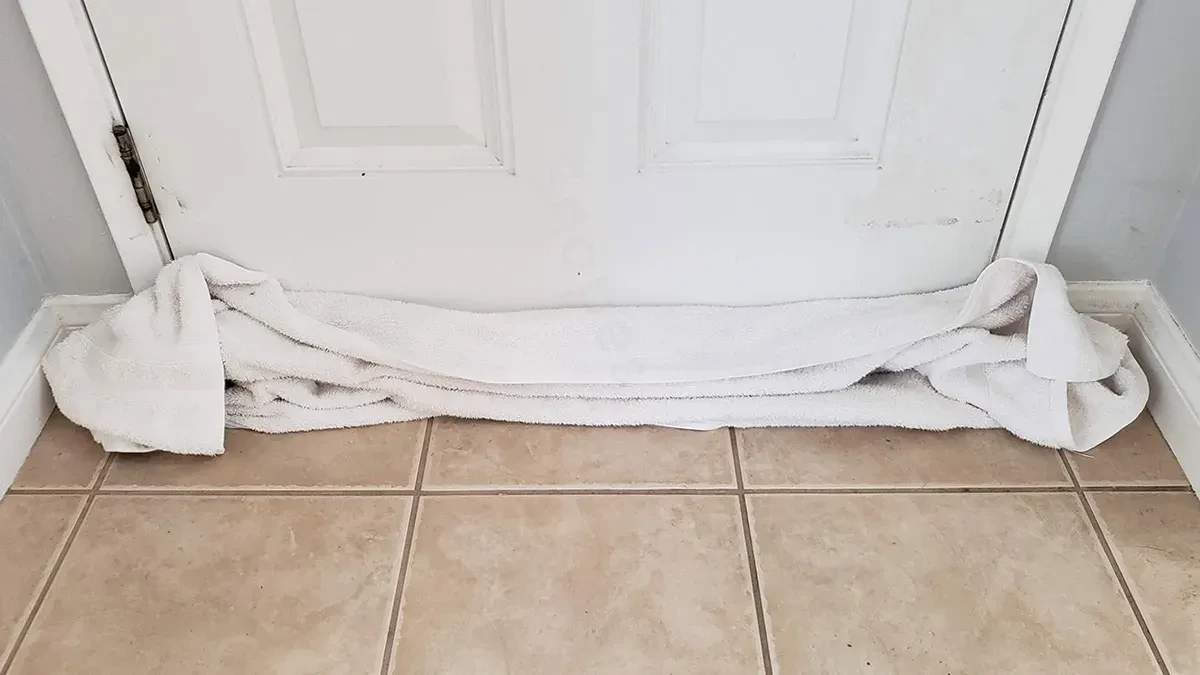
While it might seem surprisingly simple, using a towel to secure your hotel room door can add an extra layer of protection against unauthorized entry. Here’s how it’s done:
Choose the Right Towel: A hand towel or washcloth is usually the ideal size. Bath towels tend to be too bulky.
Roll it Up: Roll the towel lengthwise into a tight cylinder. This shape will be most effective for our purposes.
Position Strategically: Place the rolled towel directly over the door’s security latch. Make sure it’s partially wedged against the door frame.
Close the Door: Shut the door firmly, ensuring the towel remains in place. This will create additional resistance against disengaging the latch from outside.
1. Why This Technique Works
The effectiveness of this technique lies in a few key principles:
Obstruction: The towel acts as a physical obstruction, partially filling the gap between the door and the frame. This makes it more difficult to reach and manipulate the latch mechanism.
Resistance: The rolled towel applies pressure against the latch, adding resistance that an intruder would need to overcome to disengage the lock.
Deterrent: Although not foolproof, this simple measure makes it more obvious that someone has tampered with the door, potentially discouraging attempts at forced entry.
Sarah Miller Expert Opinion
Sarah Miller, a travel blogger and safety advocate, shares her experience with the towel technique: “I started using this trick after hearing about potential vulnerabilities with some hotel door latches. While it’s not a replacement for good hotel security, I find it provides extra peace of mind, especially when traveling solo.”
2. Step-by-Step Guide
Here’s a detailed breakdown to help you implement this simple security measure effectively:
Choosing the right type of towel
Ideal Choice: Hand towels or washcloths are the best options. They offer the right size and thickness to create an effective barrier.
Avoid: Bath towels are too large and bulky, making them less effective for wedging against the latch.
Rolling the towel correctly
Tight Roll: Roll the towel lengthwise into a firm cylinder. A tighter roll provides better resistance and is less likely to slip out of place.
Positioning the towel strategically
Placement: Position the rolled towel horizontally, directly over the door’s security latch. Ensure a portion of the towel is wedged between the latch and the doorjamb.
Overlap: The towel should slightly overlap both sides of the latch mechanism for optimal security.
Closing the door firmly
Secure Fit: Close the door with a firm push, compressing the towel against the latch. This ensures the towel provides the intended resistance, making it harder to dislodge from the outside.
Lisa Thompson Expert Opinion
Hotel security specialist, Lisa Thompson, highlights the importance of proper towel placement: “The positioning of the towel is crucial. It’s not just about stuffing something in the door gap; it’s about creating a strategic obstruction directly over the latch to hinder manipulation.”
3. Additional Tips for Maximizing Security
The towel method is a great first step, but remember, the strongest security comes from a layered approach. Here are expert-recommended techniques to use alongside the towel trick:
Using the Deadbolt
Essential Engagement: Always engage the deadbolt lock (if present) when you’re inside the room. Deadbolts are significantly stronger than standard door latches and offer increased resistance against forced entry.
Double-Check: Before leaving your room or going to sleep, ensure the deadbolt is fully engaged.
Employing a Door Wedge or Portable Security Alarm
Door Wedges: These simple, affordable devices slide under the door, adding another physical barrier to forced entry. Remember, they are most effective on carpeted floors where they can gain a better grip..
Portable Security Alarms: Compact and travel-friendly, these alarms emit a loud sound when the door is disturbed. Choose models that attach to the door handle or wedge under the door for the most effective use.
Traveling with a Doorstop
Heavy-Duty Option: A solid rubber doorstop provides substantial resistance, making it very difficult to force a door open. While a bit bulkier than wedges, they work on various surfaces and can be used in conjunction with the towel technique.
Jason Richards Expert Opinion
Security consultant, Jason Richards, stresses the importance of multiple security measures: “The towel technique is clever, but don’t rely on it solely. A layered approach employing the deadbolt, a doorstop, or an alarm significantly enhances your protection.”
Other Security Considerations
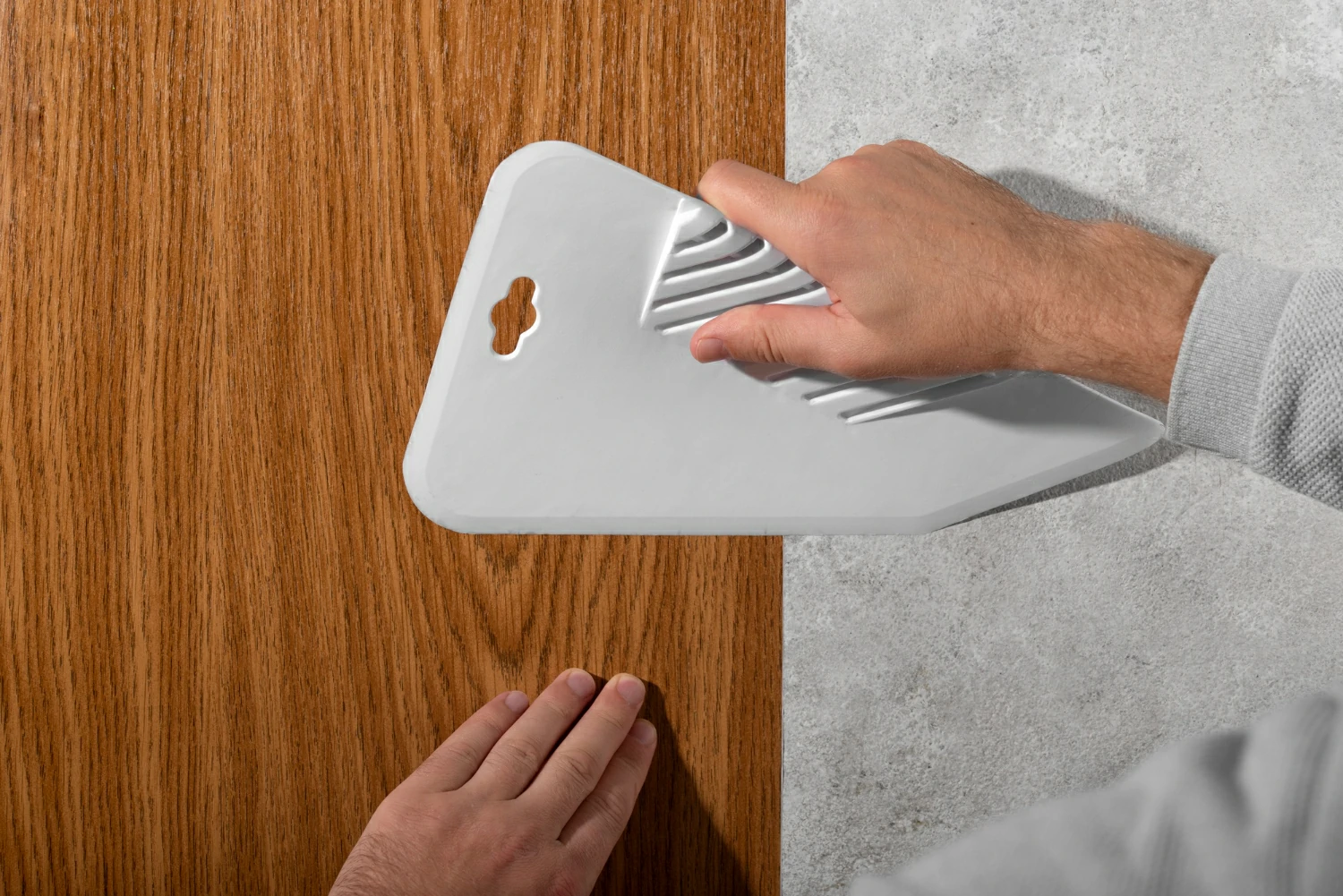
1. Choosing a Safe Hotel and Room
While the towel technique and in-room safety devices are vital, being selective about your accommodations significantly impacts your security. Here’s how to make informed choices:
Researching the Hotel’s Reputation
Online Reviews: Read reviews on travel websites and booking platforms like TripAdvisor or Booking.com. Look for consistent mentions of security practices, how the hotel handles guest concerns, and whether guests felt safe overall.
Neighborhood Safety: Research the area where the hotel is located. Check crime statistics and look for neighborhoods known for their safety and a lower crime rate.
Hotel Website: Look for the hotel’s website or contact them directly for information on their security measures. Reputable hotels will often outline security protocols such as staff training, 24-hour security presence, and controlled access.
Selecting a Room on a Higher Floor
Reduced Accessibility: Rooms on higher floors are generally less accessible from the outside, reducing the risk of opportunistic break-ins compared to ground-floor rooms.
Visibility: Higher floors may also offer a better vantage point of the surrounding area, allowing you to spot any suspicious activity.
Avoiding Rooms Near Exits or Stairwells
Foot Traffic: Rooms near exits or stairwells tend to experience higher traffic, increasing the potential for noise disturbances and opportunistic entry from individuals loitering in hallways.
Accessibility: These rooms may be slightly more accessible for intruders, especially fire exit doors that sometimes have less robust security.
Karen Spencer Expert Opinion
Travel safety consultant, Karen Spencer, emphasizes the importance of hotel selection: “Your hotel choice plays a major role in setting the baseline for your security. Do your research and choose a reputable establishment with solid safety practices.”
2. Protecting Your Valuables
Keeping your valuables safe is crucial to minimizing potential losses and disruption while traveling. Here are strategies to safeguard your belongings within your hotel room:
Using the Hotel Safe
Priority Storage: If your hotel room offers a safe, utilize it for essential items like your passport, extra cash, jewelry, and expensive electronics.
Read the Instructions: Familiarize yourself with the safe’s operation before storing your items. If it’s electronic, ensure you create a secure and memorable passcode.
Request a Receipt: Some hotels offer a receipt or inventory log for items stored in their safes. If this option is available, it adds a layer of accountability.
Keeping Valuables Out of Sight
Don’t Advertise: Avoid leaving valuable items like laptops, cameras, or designer bags in plain sight within your room. Even when you step out for a short time, place them in drawers or closets.
Utilize the ‘Do Not Disturb’ Sign: When leaving your room, hanging the ‘Do Not Disturb’ sign can discourage casual entry by housekeeping staff or others, creating an opportunity for opportunistic theft.
Unpacked Luggage: If possible, unpack your luggage and store it out of view. A packed suitcase signals to potential thieves that you likely have valuables inside.
Mark Anderson Expert Opinion
Hotel security specialist, Mark Anderson, advises: “Never assume your hotel room is an impenetrable fortress. Taking simple measures to secure your belongings prevents unnecessary heartaches and allows you to focus on enjoying your trip.”
3. Being Aware of Your Surroundings
Staying alert and aware of your surroundings is essential, both within the hotel and when exploring your destination. Here’s how to prioritize situational awareness:
Identifying Emergency Exits
Upon Arrival: When you first enter your hotel room, take a few moments to locate the emergency exits and evacuation routes. This information is typically posted on the back of the room door or in the hotel information booklet.
Mental Map: Familiarize yourself with the layout of your floor so you know the general direction of the exits, in case of low visibility during an emergency.
Reporting Suspicious Activity
Trust Your Gut: If you see someone loitering in the hallways, acting suspiciously, or attempting to access rooms that don’t seem to be theirs, don’t hesitate to report it to hotel staff.
Err on the Side of Caution: It’s better to report something that turns out to be innocent rather than ignore a potentially dangerous situation.
Contact Information: Keep the hotel’s front desk and security number easily accessible on your phone or in your wallet.
What Does It Mean to Put a Towel Under Your Hotel Room Door?
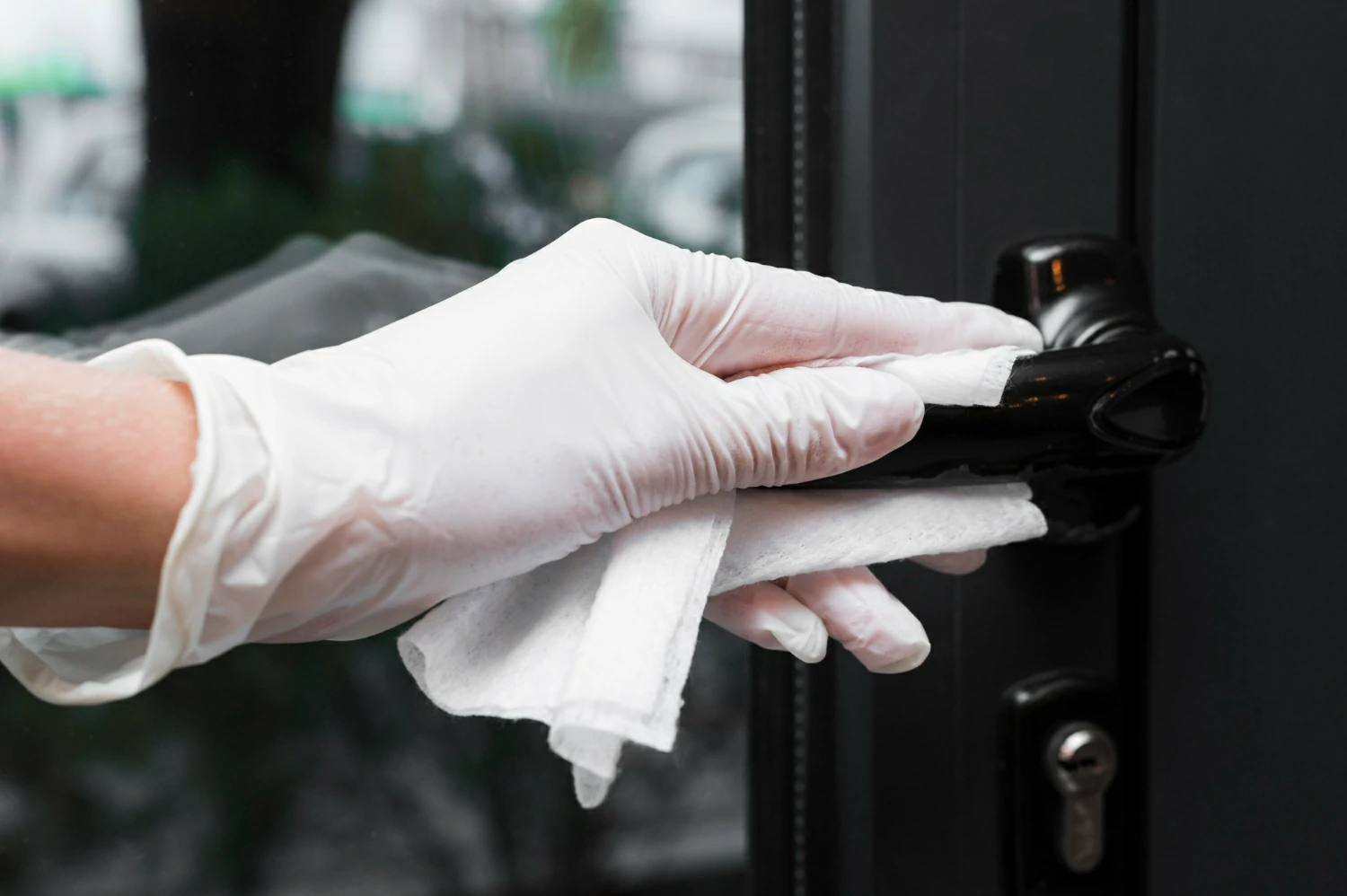
1. Understanding the Viral Social Media Trend
The trend of placing a towel under the hotel room door gained notoriety primarily on platforms like TikTok, where creators share quick travel and safety tips. Here’s the basic idea:
The Claim: Proponents of this trend suggest that placing a rolled towel under the door, partially obstructing the gap between the floor and the door bottom, makes it more difficult for someone to see inside your room or manipulate tools underneath to tamper with the lock.
The Logic: The notion is that it creates an additional visual and potential physical barrier, deterring any ill-intentioned individuals.
2. Potential Security Concerns Linked to This Practice
While well-intentioned, security experts caution against relying solely on this technique for several reasons:
False Sense of Security: This method might create the illusion of safety but offers limited actual protection. A determined person could easily dislodge the towel with force.
Signaling Vulnerability: Some experts argue that a towel under a door could inadvertently signal an occupied room that is being guarded by someone conscious of security, potentially drawing unwanted attention.
Fire Safety Hazard: In case of a fire emergency where smoke seeps under the door, a towel could delay detection of the danger, hindering a timely evacuation.
Lisa Miller Expert Opinion
Travel security consultant, Lisa Miller, expresses her concerns: “Well-meaning viral trends like this can be misleading. While any additional precaution is better than none, travelers should prioritize proven security measures instead of relying on makeshift solutions.”
3. Safer, Alternative Security Techniques
Here are far more reliable ways to enhance your hotel room security:
The Towel Technique: As discussed previously, using a towel to partially obstruct the door’s LATCH offers a more strategic and targeted approach.
Deadbolt and Chain: Always utilize the deadbolt and security chain (if equipped) on your hotel room door. These provide significantly stronger resistance against forced entry.
Door Wedge or Alarm: These portable devices offer supplementary protection and act as effective deterrents when used in conjunction with other measures.
Valuables in the Safe: Storing your expensive belongings and documents in the room’s safe (or at the front desk if available) minimizes the potential for theft.
FAQs
Is this towel technique foolproof?
Absolutely not. While the towel technique can add a layer of difficulty in manipulating a door latch, it should never be considered a foolproof security guarantee. It’s vital to utilize it in conjunction with deadbolts, door wedges, or other security devices for optimal protection.
Can I use other items besides a towel?
Yes, but choose wisely. A rolled-up travel blanket or a similarly shaped soft item can work as substitutes for a towel. Avoid rigid objects that might damage the door or the floor. The key principle is to create a partial obstruction against the latch.
What if my hotel room doesn’t have a latch?
Unfortunately, some older hotel rooms may lack a security latch. In this case, placing a towel over the latch area won’t provide the intended benefit. Prioritize utilizing these strategies instead:
- Deadbolt: Make sure you always engage the deadbolt lock (if present).
- Door Wedge or Alarm: These portable devices become even more critical for added security in rooms without latches.
- Request a Room Change: If you’re genuinely concerned, don’t hesitate to request a room change at the front desk to a room that does have a security latch.
How can I make sure my hotel room door is secure?
The best hotel room security comes from a multi-layered approach. Follow these guidelines:
- Inspect the Door: Check the door, frame, and locks for signs of damage or tampering. Report any irregularities immediately.
- Deadbolt and Chain: Always utilize these whenever you’re present in the room.
- Towel Technique: Employ the towel technique as an additional deterrent against latch manipulation.
- Portable Devices: Travel with a door wedge or portable alarm for enhanced protection.
- Valuables Secured: Use the room safe for passports, excess cash, and expensive items.
- Be Aware: Stay alert to your surroundings within the hotel and report any suspicious activity to staff.
Conclusion
Feeling safe and secure while traveling is essential for a positive and worry-free experience. While no method is infallible, understanding the value and limitations of the towel technique, combined with a multi-pronged security strategy, significantly minimizes potential risks within your hotel room.
